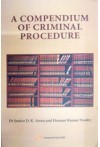- Author(s): D.K. Arora, Hemant Kumar Pandey
- Publisher: Thomson Sweet & Maxwell
- Edition: 1 Ed 2023
- ISBN 13 9789390529162
- Approx. Pages 998 + Contents
- Format Hardbound
- Approx. Product Size 24 x 16 cms
- Delivery Time 3-5 working days (within Kerala & South India) (Others 7-9 days)
- Shipping Charge Extra (see Shopping Cart)
............................................................................................
Description
We have great pleasure in presenting A Compendium of Criminal Procedure before the legal fraternity, teachers, Judges, advocates, aspirants of competitive examinations and law students. During our interaction with young advocates, aspirants of competitive examinations and law students, it was felt that there seems to be a crying need for a book on the Code of Criminal Procedure that could fulfil their requirements in a simple manner. Keeping in view this aspect we have prepared this book in very simple language which is the first of its kind. We intend to fulfil the need of the knowledge of Criminal Procedure in a graded manner and at the same time packaging it in a capsule form for all the stakeholders. Criminal law, in its wider sense, consists of both the 'substantive criminal law' and procedural criminal law. The substantive criminal law defines offences and prescribes punishment for the same, whereas the procedural criminal law facilitates to administration of the substantive law and the protection of society against criminals and law breakers. The procedural criminal law has been designed to look after the process of administration and enforcement of substantive criminal law. In the absence of procedural law, the substantive criminal law would be of not much importance because with-out the enforcement mechanism, the threat of punishment held out to the law breakers by the substantive criminal law would remain a mere formality and empty practice. Empty threats do not prevent crime and without deterrent effect, the law of crimes would be of hardly any meaning or justification. The purpose of the Criminal Procedure Code and the Penal Code, 1860, is to effectively execute administration of the criminal justice system and protect society from perpetrators of crime. It has a twin purpose; firstly, to adequately punish the offender in accordance with law and, secondly, to ensure prevention of crime. The Criminal Procedure is complementary to the substantive criminal law and failure of the procedure in criminal laws would seriously affect the substantive criminal law.
.........................................................................................
Contents
Chapter 1 : Preliminary
Chapter 2 : Constitution of Criminal Courts and Offices
Chapter 3 : Power of Courts
Chapter 4A : Powers of Superior Officers of Police
Chapter 5 : Arrest of Persons
Chapter 6 : Processes to Compel Appearance
Chapter 7 : Processes to Compel the Production of things
Chapter 8 : Reciprocal arrangement for assistance in certain matters and procedure
for Attachment and Forfeiture of Property
Chapter 9 : Security for keeping the Peace and for Good Behavior
Chapter 10 : Order for maintenance of wives, children and Parents
Chapter 11 : Maintenance of Public Order and Tranquillity
Chapter 12 : Preventive Action of the Police
Chapter 13 : Information to the Police and their Powers to Investigate
Chapter 14 : Jurisdiction of the Criminal Courts in Inquiries and Trials
Chapter 15 : Conditions Requisite for Initiation of Proceedings
Chapter 16 : Complaints to Magistrates
Chapter 17 : Commencement of Proceedings before Magistrates
Chapter 18 : The Charge
Chapter 19 : Trial before a Court of Session
Chapter 20 : Trial of Warrant Cases by Magistrate
Chapter 21 : Trial of Summons Cases by Magistrate
Chapter 22 : Summary Trials
Chapter 23 : Plea Bargaining
Chapter 24 : Attendance of Persons Confined or Detained in Prisons
Chapter 25 : Evidence in Inquiries and Trials
Chapter 26 : General Provisions as to Inquiries and Trials
Chapter 27 : Provisions as to Accused Persons of Unsound Mind
Chapter 28 : Provisions as to Offences Affecting the Administration of Justice
Chapter 29 : The Judgment
Chapter 30 : Submission of Death Sentences for Confirmation
Chapter 31 : Appeals
Chapter 32 : Reference and Revision
Chapter 33 : Transfer of Criminal Cases
Chapter 34 : Execution , Suspension, Remission and Communication of Sentences
Chapter 35 : Provisions as to Bill and Bound
Chapter 36 : Disposal of Property
Chapter 37 : Irregular Proceedings
Chapter 38 : Limitation for taking Cognizance of Certain Offences
Chapter 39 : Miscellaneous
............................................................................................
Author Details
DR JUSTICE D. K. ARORA, LL.D. Former Judge Allahabad High Court Chairman, U.P. Real Estate
Appellate Tribunal, and
HEMANT KUMAR PANDEY, LL.M. Advocate, High Court, Lucknow
Assisted by
RAMIT SINGH
Fifth year student, Institute of Law, Nirma University Ahmedabad, Gujarat

